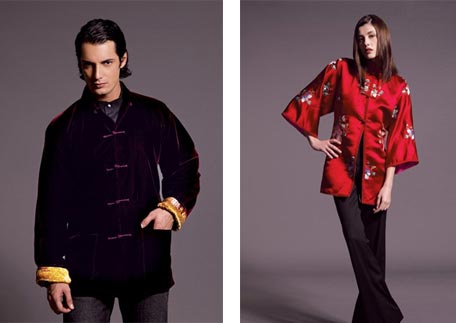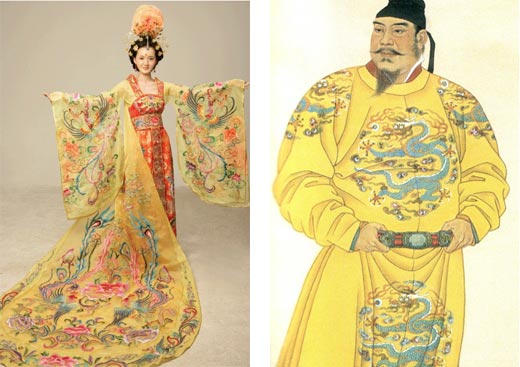
The term“tang suit”is originated from abroad. A Chinatown is a section of an urban area associated with a large number of Chinese within a city outside the majority. The local people always named the Chinatown as“town of people from Tang Dynasty”(唐人街)and called these Chinese“people from Tang Dynasty”(in Chinese唐人) since Tang dynasty was the most thriving, prosperous, splendid, and glorious period of ancient Chinese. Thus, the clothing worn by the Chinese is called“tang suit”.
Actually“tang suit”is not the clothing of Tang Dynasty. They are totally different. The origin of Tang suit or Tang jacket can be traced back to Qing Dynasty. It is evolved from Magua from Qing Dynasty, a traditional Chinese costume worn by males. It is a short tunic with high and round collars and lapels, which are fasten down the front. By the 1940s, what we now know as the Tang suit became prevalent for all classes in China. Compared with the ancient style, the sleeves had become longer and wider. Patch pockets were added and the number of frog buttons became standard at seven. This jacket was worn with matching pants.

The unified and prosperous China was established in the Tang Dynasty (618-907). In China's history, the Tang Dynasty was a period when the polity and economy were highly developed and the culture and art were thriving.
Women's dress and personal adornments of the Tang Dynasty were outstanding in China's history. The clothing materials were exquisite, the structure was natural, graceful and elegant, and adornments were splendid. Though the forms of garments were still the continuation of the Han Dynasty (206BC-220AD) and the Sui Dynasty (581-618), they were influenced by cultures and arts of the Western Regions. Especially, the national power of the High Tang was strong. The trades and cultural exchanges with Korea, Vietnam, Japan, Persia and other countries gradually became frequent, and they mutually dispatched emissaries and accepted students of other countries. In this way, a special open and romantic style of dress and personal adornments was formed.
Because of communication with the Western Regions, the influence of dressing culture of other minorities on the Tang court also reflected the change of thoughts and concepts. The social status of ancient women was very low: they often served as Jileren (music performer), Guanji (official performer), Gongji (palace performer) and Jiaji (family performer), and were regarded as the playthings and goods that can be sold and bought by rich people. Some females had rebel spirit in the Tang Dynasty, so they climbed or jumped over the walls and went to the nature to view the beautiful scenes and/or go sightseeing in the spring by riding horses with men. Just as recorded by many historical materials, some girls therefore dressed as boys in order to go out.
The garments in the Tang Dynasty also greatly affected the garments of neighboring countries. For instance, Japanese kimono adopted the elites of the dresses of the Tang Dynasty in terms of colors, and the Hanbok (traditional Korean clothing) also adopted the advantages of the dresses of the Tang Dynasty. The dresses of the Tang Dynasty were mainly made of silk, so dresses were famous for softness and lightness. The dresses of the Tang Dynasty boldly adopted the features of foreign garments in terms of forms and adornments; i.e. they mainly referred to the garments of other countries (such as the Central-Asia countries, India, Iran, Persia, northern countries and the Western Regions) and used them to improve the culture of the Tang Dynasty.